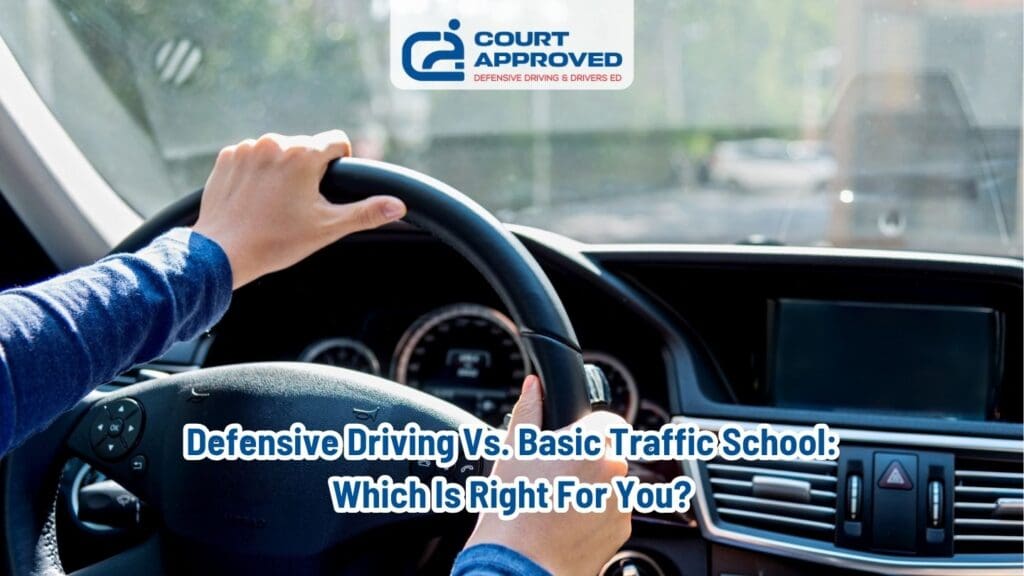Understanding the differences between defensive driving courses and basic traffic school can save you both time and money while keeping your driving record clean. Each option serves a unique purpose, but deciding which one fits your needs depends on your goals and situation. This blog will break down the benefits of each option, compare their features, and guide you toward the best decision for your circumstances. Whether your aim is to polish driving skills or meet legal requirements, we’ve got you covered. Keep reading to make an informed choice that aligns with your goals.
Key Takeaways
- Defensive driving courses enhance advanced driving skills and can lead to ticket dismissal and lower insurance premiums, while traffic school focuses on refreshing knowledge of traffic laws primarily as a court-mandated requirement.
- Defensive driving allows for voluntary enrollment with flexible options, including online classes, whereas traffic school is generally required after specific violations to prevent points on driving records.
- Both courses vary in costs and durations; defensive driving classes can cost between $25 and $300 and typically last about six hours, while traffic school typically costs between $100 and $300 and can range from four to eight hours.
Understanding Defensive Driving School
A driving school that specializes in defensive driving aims to impart superior skills for navigating the roads, recognizing potential hazards, and managing emergency situations with composure. Defensive driving courses are a beneficial resource for all drivers regardless of their experience level since there’s perpetual scope for honing one’s capabilities behind the wheel.
Enrolling in these courses provides not just an upgrade to your skillset but also tangible advantages like being eligible to have a ticket dismissed or securing lower insurance premiums, translating into financial savings you’ll be pleased about. This is indeed fortunate as it can lead to significant monetary savings over time.
Eligibility for Defensive Driving School
The requirements for attending defensive driving classes may differ depending on the state due to various local laws that dictate what kinds of traffic violations qualify and how often you’re allowed to enroll in these courses. For example, Texas permits drivers to sign up for a traffic school course once every year with the purpose of having a ticket dismissed. Intriguingly, possession of an actual driver’s license isn’t necessary. Showing any legitimate government-issued identification will suffice.
It is essential when seeking ticket dismissal through such educational measures to take part in a course sanctioned by the state, particularly in places like Texas, where this endorsement is required. Being aware of these prerequisites assists you in assessing whether you meet the conditions needed and aids your decision-making process regarding participation in a defensive driving school program.
Read More: Why You Should Never Pass a School Bus in Texas
Cost and Duration
Prices for defensive driving courses vary significantly, often ranging from $25 to $300 based on the provider and geographic location. As an instance, while Texas offers these courses at a reasonable cost of around $25, they can surpass the mark of $300 in different states due to factors linked with the course content and the educational establishment providing it.
Similarly, there is variability in how long these classes take. A standard defensive driving class in Texas usually spans six hours. This duration may not be consistent across all states. Being aware of both the financial implications and time commitment involved is important for proper planning prior to enrollment in such a program.
Online vs In-Person Classes
Defensive driving courses provide the significant benefit of flexibility when taken online. Participants can finish their defensive driving class at a pace that suits them and arrange it around their own schedule, offering convenience as well as easy access. This is especially useful for individuals with hectic schedules or those who may not have easy access to physical classes.
On the other hand, in-person classes are typically bound by set times and require participants to be present at designated locations, which might not be as convenient for everyone. Nevertheless, they provide a structured setting that some learners may prefer due to its engaging nature. When deciding between taking a course online or attending in person, one should consider personal preferences and how availability differences could influence their choice.
Basics of Traffic School

Traffic school serves as an educational update, emphasizing traffic regulations and safe driving techniques. Often, drivers are directed to attend these courses by a court mandate following the issuance of a traffic ticket to meet legal obligations and diminish violations on their record. The primary goal of such courses is to enhance motorists’ comprehension of road laws and promote safer driving behaviors, thereby helping them steer clear of future infractions.
The purpose behind attending traffic school is typically court-ordered, with the intent to help drivers prevent points from being added to their driving records for specific offenses. This corrective action ensures that individuals are thoroughly versed in road rules and capable of upholding an unblemished driving history.
Types of Violations Covered
Drivers who commit common offenses such as speeding or running red lights, along with other significant moving violations, are often mandated to attend traffic school. The purpose of this requirement is to educate drivers on the gravity of their infractions and diminish the chance that they will violate traffic laws again.
By participating in a traffic school course, individuals receive instruction regarding both legal ramifications and safety concerns tied to their actions. Successfully finishing this educational program enables drivers to meet court stipulations and may lead to a reduction in penalties linked to their transgressions.
Read More: All You Need to Know About Texas Traffic Violations and Fines
Course Structure and Content
Courses at traffic school Delve into vital subjects such as traffic legislation, defensive driving techniques, and the consequences associated with committing traffic violations. These programs aim to update drivers’ comprehension of road rules. By reviewing these core concepts, motorists can enhance their grasp of and dedication to practicing safe driving behaviors.
The educational content includes in-depth dialogues about strategies for secure driving and the repercussions that follow breaches of traffic regulations. With this thorough perspective, the courses are designed to prepare drivers adequately so they can drive with care on public roads and prevent subsequent violations.
Read More: How to Select the Right Defensive Driving Course for You
Costs and Length
Traffic school fees can fluctuate widely, often falling between under $100 and close to $300 based on the selected program. This disparity in pricing plays a role in influencing whether or not drivers opt to sign up for such courses, especially when considering any extra fines they might be facing.
Courses at traffic schools typically last from four to eight hours, varying with each individual course offering. Drivers who understand both the financial burden and time commitment of these programs are better equipped to arrange their schedules and satisfy the obligations stipulated by the court.
Key Differences Between Defensive Driving and Traffic School
On the other hand, traffic school typically serves as a mandated response by judicial systems aimed at bolstering drivers’ comprehension of traffic laws and acting as remedial action following violations. Recognizing these variances is crucial for selecting an appropriate course tailored to your requirements, be it advancing your driving abilities or complying with judicial mandates.
Purpose and Goals
Defensive driving school focuses on elevating a driver’s ability to operate their vehicle with greater caution and forward-thinking. It targets those who have committed minor traffic offenses such as speeding or disregarding a red light. The courses offered by the school emphasize mastering sophisticated maneuvers and recognizing possible dangers, equipping drivers to evade future collisions and contributing positively to road safety.
Conversely, attending traffic school serves to update motorists on current traffic regulations while concealing demerit points from one’s driving record. Despite having no impact on the obligation to settle any imposed fines, successful completion of these courses can help maintain an untarnished driving history and prevent escalation in insurance premiums.
Court Mandates vs Voluntary Enrollment
Attending traffic school is often a mandate imposed by the court after an individual has committed a traffic violation. The courts compel participation to guarantee that drivers are adequately educated about road regulations and safe driving techniques. This stipulation serves to amend driver conduct and diminish the chances of subsequent infractions.
On the other hand, engaging in defensive driving courses is an elective action undertaken by those who desire to advance their driving competencies and possibly decrease their vehicle insurance rates. Although not commonly compulsory as per court orders, these courses present considerable advantages for proactive motorists who aim to bolster their safety while navigating on the streets.
Impact on Driving Record and Insurance Rates
Successfully finishing a defensive driving course can result in decreased insurance premiums, as insurers typically reward drivers who actively improve their driving abilities with lower rates. The monetary benefits serve as an incentive for numerous drivers to engage in these courses.
Enrolling in traffic school is beneficial for concealing demerit points on one’s driving record. Although this action doesn’t reduce insurance costs outright, it helps avoid the accumulation of points that could otherwise elevate insurance rates by adversely affecting your record.
Read More: What Kind of Driving Record Is Required for Defensive Driving Courses in Texas Courts?
Benefits of Taking Defensive Driving Courses
Enrolling in defensive driving courses presents a range of advantages that extend well beyond the simple cancellation of traffic tickets and potential reductions in insurance rates. These courses are specifically designed to bolster one’s driving abilities while advocating for increased safety on the road.
Through an emphasis on sophisticated driving strategies and learning how to foresee possible hazards, individuals who participate in these courses acquire essential insights. This instruction empowers them with greater command over diverse driving conditions, substantially improving their overall competence behind the wheel in numerous circumstances.
Ticket Dismissal and Point Reduction
Taking a defensive driving course is often recognized in various areas to have traffic tickets dismissed. As such, drivers can have their traffic infractions cleared and avoid the accumulation of points that could negatively impact their driving history. Completion of the course may lead to a point reduction on one’s license, which is vital for steering clear of potential penalties like license suspension.
For instance, within Texas, drivers are permitted to participate in a defensive driving class every 12 months, specifically for the purpose of ticket dismissal. This provision aids motorists in preserving an unblemished record while enhancing their proficiency behind the wheel.
Insurance Premium Discounts
Numerous insurance companies provide premium discounts to policyholders who have successfully completed a defensive driving course. The discount you may receive varies from one insurer to another and can be anywhere between 5% and 20%, based on the details of the defensive driving courses completed. Because of this economic advantage, many drivers consider taking a defensive driving course to be a valuable investment.
By completing a course in defensive driving, not only do drivers improve their skills behind the wheel, but they also stand to gain from reduced rates on their car insurance premiums.
Long-Term Safety Benefits
Participating in defensive driving courses yields significant, enduring benefits for road safety. These courses help instill improved driving practices like keeping adequate spacing and adhering to speed limits, resulting in a safer environment for everyone on the road. Heightened vigilance ensures that drivers remain more aware of their environment, which minimizes accidents due to distractions.
By employing strategies learned from defensive driving courses, motorists can markedly lessen the probability of collisions occurring, thereby reducing injuries and saving lives. In essence, the advantages gained from these safety-focused programs continue to influence driver behavior positively long after they have finished taking the course.
How to Sign Up for a Defensive Driving Course
Enrolling in a defensive driving course can be accomplished with ease by using an authorized provider or a state-approved website. The process is designed to be uncomplicated and accessible, offering the option of either online or in-person attendance for your convenience.
By opting for a course approved by the state of California, you ensure that it fulfills the criteria necessary for dismissing a traffic ticket and may also qualify for insurance-related benefits upon payment and completion of the eligible defensive driving program.
Choosing a State-Approved Course
Opting for a defensive driving course that has been approved by your state is crucial if you aim to have a ticket dismissed or secure discounts on your insurance. The specifications for such courses can differ from one state to another, so it’s important to select one endorsed by the proper authorities to satisfy the relevant standards.
In places like Texas, enrolling in an officially sanctioned defensive driving course is required if you wish to get rid of a traffic ticket. Ensuring that the course has received state recognition not only saves time and money but also offers the advantages associated with taking it.
Online Enrollment Process
Registering for a defensive driving course online involves submitting your driver’s license number and some form of identification. This process is designed to be user-friendly, enabling you to complete the necessary sign-up steps without having to leave home. Payment information must be provided to secure your place in the course.
The option of attending traffic school via an online platform offers the advantage of self-paced learning, accommodating those with demanding schedules by allowing them to learn defensive driving techniques as their time permits.
In-Person Class Registration
Choosing to take a defensive driving course in person necessitates finding accredited local providers. Confirming that the class adheres to state mandates for both dismissing tickets and obtaining insurance rebates is important. By examining their schedules, you can arrange your participation appropriately, making certain that you finalize the course within any stipulated deadlines.
Before enrolling in an on-site class, it’s vital to check session times and availability with area providers. Doing so will help guarantee that attending these classes doesn’t interfere with your existing obligations.
Attending defensive driving classes in person offers students an organized educational setting, which may enhance engagement and learning effectiveness for some individuals.
Defensive driving: online vs classroom – find your best fit
Choosing between online and classroom options for Lubbock defensive driving courses often depends on your personal learning style and availability. Online courses offer unparalleled flexibility, allowing you to work at your own pace and complete lessons from the comfort of your home. This is ideal for those with busy schedules who prefer convenience. On the other hand, classroom-based sessions provide a more structured environment with direct interaction with instructors, which can be beneficial for individuals who learn better through face-to-face engagement. Both options are designed to help drivers improve their skills, but understanding your preferences will guide you toward the right choice.
Making the Right Choice for Your Driving Goals
Choosing between defensive driving and traffic school ultimately comes down to your personal needs and objectives. Whether you aim to dismiss a ticket, enhance your driving skills, or avoid higher insurance premiums, understanding the distinct purposes of each course is key. Defensive driving courses are designed for proactive safety improvement, while traffic school often serves as a court-mandated refresher on driving laws.
At Court Approved Defensive Driving, we provide a flexible, state-approved program tailored to help you achieve your goals. Our online course, accessible to drivers across Texas, including those seeking options for defensive driving in Lubbock, is convenient and easy to complete at your own pace. With the potential to dismiss tickets, lower insurance premiums, and enhance your driving skills, our course equips you for a safer, smarter experience on the road. Take the driver’s seat in your learning today and start paving the way to safer journeys — contact us today to get started!
Frequently Asked Questions
What is the structure of the Texas Defensive Driving Course?
Individuals have the advantage of completing the Texas defensive driving course at their own pace since it is designed to be self-paced and available online.
Such flexibility significantly improves the overall experience of learning defensive driving.
How long does a Texas Defensive Driving Class typically last?
Most defensive driving courses in Texas have a standard duration of six hours for the class.
How often can you take a defensive driving course for ticket dismissal in Texas?
You may take a defensive driving course for ticket dismissal in Texas once every 12 months. This frequency allows drivers to effectively manage their traffic violations while improving their driving skills.
Is it mandatory to take a state-approved defensive driving course in Texas for ticket dismissal?
In Texas, courts typically require the completion of an approved defensive driving course for the dismissal of a ticket.




